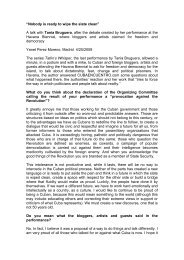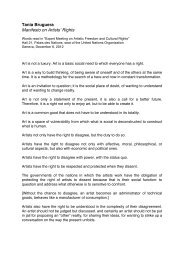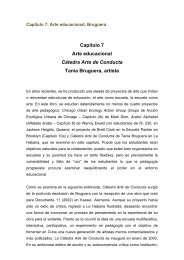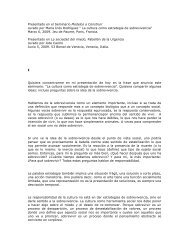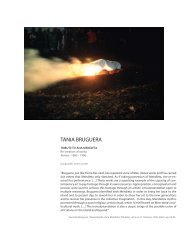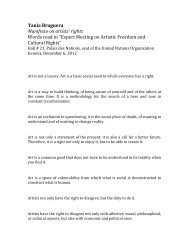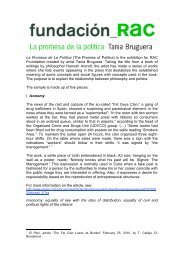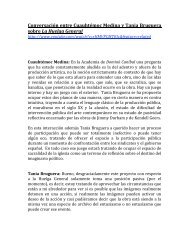Download PDF - Tania Bruguera
Download PDF - Tania Bruguera
Download PDF - Tania Bruguera
Create successful ePaper yourself
Turn your PDF publications into a flip-book with our unique Google optimized e-Paper software.
Fig. 4. <strong>Tania</strong> <strong>Bruguera</strong>, Memoria de la<br />
Postguerra I (Memory of the Postwar I).<br />
Medium: editing of a newspaper. Year: 1993.<br />
Materials: collaboration with Cuban artists<br />
living inside and outside Cuba, black ink/<br />
newsprint. Dimensions: 13.4 ′′ × 8.4 ′′ .<br />
(Courtesy of the artist. Photo: <strong>Tania</strong> <strong>Bruguera</strong>.)<br />
12. For a detailed account of ‘Special Period’<br />
measures, see Ariana Hernandez-Reguant,<br />
‘Writing the Special Period: An Introduction’, in<br />
Hernandez-Reguant (ed.), Cuba in the Special<br />
Period: Culture and Ideology in the 1990s (Palgrave<br />
Macmillan: New York, 2009).<br />
13. In response to the third mass exodus of<br />
Cubans seeking asylum in the USA, the Clinton<br />
Administration revised the 1966 Adjustment Act<br />
in accordance with the ‘wet foot, dry foot’ policy.<br />
This policy mandates that any Cuban migrant<br />
intercepted at sea (i.e. ‘wet foot’) will be<br />
returned to Cuba. In short, the US government<br />
repatriates those Cubans who do not step on US<br />
soil. See Pérez-Stable, p. 51.<br />
14. José Martí, ‘Our America’, in José Martí:<br />
Selected Writings, trans. by Esther Allen (Penguin<br />
Books: New York, 2002), p. 293.<br />
15. Article 53 of the 1976 Constitution reads as<br />
follows: ‘Freedom of speech and the press, in<br />
accordance with the goals of Socialist society, is<br />
recognized for its citizens. The material<br />
conditions for their exercise are guaranteed by the<br />
fact that the press, the radio, television, movies<br />
and other mass media are state or social property<br />
in place since 1962. 12 Government officials identified foreign investment, the<br />
decriminalisation of the US dollar and international tourism as promising<br />
remedies. Tens of thousands of Cubans proposed another solution. They left<br />
Cuba.<br />
In 1991, Castro once again opened the waters. As in April 1980, Castro told<br />
those who were not strong enough to fight for the Revolution to go. Between<br />
1991 and 1994, nearly 36,000 Cubans did, though many of them (about<br />
33,000) ended up back in Cuba – or, at least on the island. Barred from<br />
entering the United States following President Clinton’s revision of the 1966<br />
Cuban Adjustment Act, which had allowed anyone fleeing Cuba entry to the<br />
United States for one year, many balseros, as they were known for<br />
the makeshift rafts they rigged on the shores of Cojimar, were deported to<br />
the US Naval Base in Guantánamo Bay. 13 The first years of the 1990s, in<br />
short, were economically and psychically catastrophic. The Revolution had<br />
failed to strangle the ‘octopus’ in the North, to borrow José Martí’s famous<br />
description of the US in the 1890s, and it seemed for certain that these were<br />
in fact the last days of Revolution. 14<br />
In 1993, <strong>Bruguera</strong> extended her investigation of the ways in which the Cuban<br />
government organises history with Memoria de la postguerra (Memory of the<br />
Postwar) (Figs 4 and 5). An underground newspaper mimicking the format of<br />
Granma, the official Cuban Communist Party daily, Memoria directly<br />
confronted the means by which the Cuban government secured its lock on<br />
writing – and rewriting – Cuba’s history. Granma is one of two print-based<br />
dailies published on the island; the other, Juventude Rebelde, the newspaper of<br />
the Union of Young Communists, is also operated by the party. In 1975,<br />
with the inauguration of the First Party Congress, the Constitution of the<br />
Republic of Cuba granted the Communist Party the right to control the<br />
press, recognising ‘freedom of speech and the press in accordance with the<br />
goals of the socialist society’. The press and all mass media, including radio,<br />
television, and film as well as the island’s billboards, streets, and<br />
monuments, were free, the party argued, because they were not ‘private<br />
property’. 15 Though codified in 1975 as the party’s Propaganda Laws, these<br />
measures find their origin in the revolutionary rhetoric of the 1960s, when<br />
Castro gathered Cuba’s artists and writers at the National Library in June<br />
1961 to address their role in the advancement of the Revolution. Castro’s<br />
address, ‘Words to Intellectuals’, coined the phrase that came to circumscribe<br />
all future debates about freedom of expression in Cuba: ‘Within the<br />
Revolution, everything; against the Revolution, no rights at all’. 16 In advance<br />
of the codification of the party’s Propaganda Laws, Castro had conveniently<br />
sidestepped the issue of censorship. Acknowledging that not all artists and<br />
intellectuals are revolutionaries, Castro banned all artistic acts ‘doubting’ the<br />
Revolution. 17<br />
<strong>Tania</strong> <strong>Bruguera</strong>: Between Histories<br />
‘Nothing against the Revolution,’ he explained, ‘because<br />
the Revolution has its rights also, and the first right of the Revolution is the<br />
right to exist.’ 18<br />
<strong>Bruguera</strong>’s newspaper doubly addressed the party’s Propaganda Laws. Its<br />
editorials and articles offered the Cuban public another version of the daily<br />
news. Memoria was also the first Cuban newspaper to publish the writings of<br />
Cubans living in exile. Since 1961, the thoughts and desires of the exile<br />
community had not been aired on the island. They had been eliminated from<br />
the historical record. ‘When you leave,’ <strong>Bruguera</strong> once remarked, ‘it’s as if<br />
you are being erased from culture.’ 19 Not surprisingly, in 1994, with the<br />
publication of the newspaper’s second edition, Memoria was censored.<br />
<strong>Bruguera</strong> was called before the Arts Council and told to stop her publication.<br />
OXFORD ART JOURNAL 35.2 2012 221



